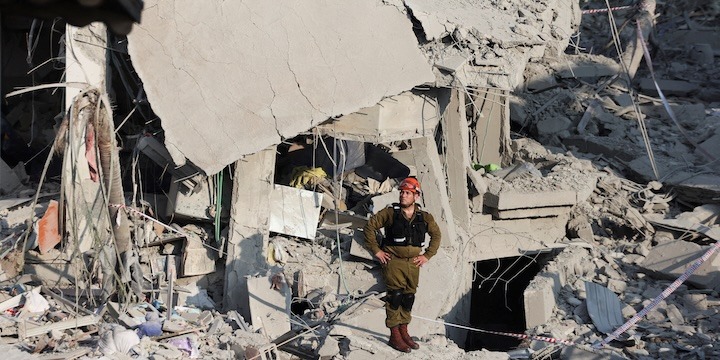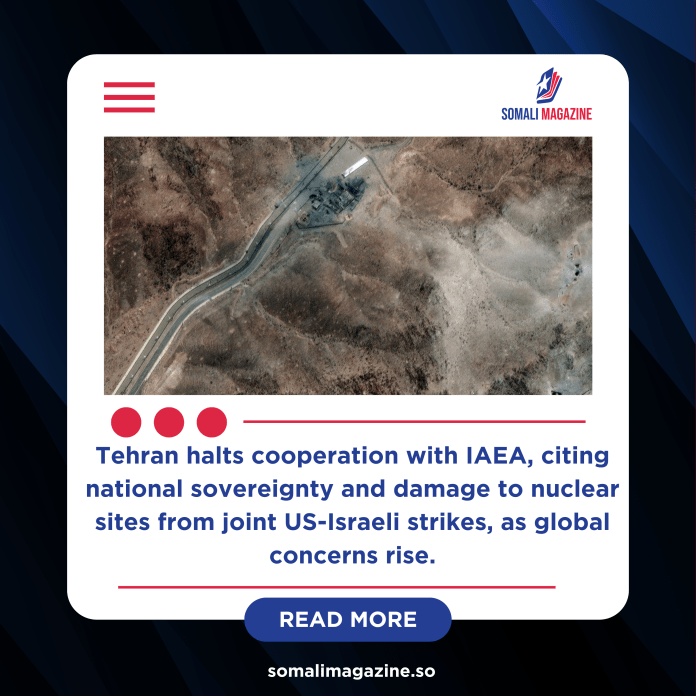Facebook Twitter (X) Instagram Somali Magazine - People's Magazine
Iran has officially decided to suspend its cooperation with the United Nations nuclear watchdog, the International Atomic Energy Agency (IAEA), following its recent war with Israel and the United States.
The decision came after Iran’s Guardian Council—an unelected body with the power to approve or reject laws passed by parliament—ratified legislation previously passed by lawmakers. The Council said the bill did not violate Islamic principles or the Iranian Constitution.
Hadi Tahan Nazif, the spokesperson for the Guardian Council, said the Iranian government is now required to stop working with the IAEA to protect the country’s sovereignty and nuclear facilities. He blamed the US and Israel for attacking Iran’s peaceful nuclear sites during the conflict.
Nazif also said the bill would allow Iran to continue activities permitted under the international Non-Proliferation Treaty (NPT), especially uranium enrichment. The law is now awaiting final approval from newly elected President Masoud Pezeshkian.
Iran’s Parliament Speaker Mohammad Bagher Ghalibaf stated that cooperation with the IAEA is no longer acceptable because the agency had failed to condemn attacks on Iranian nuclear facilities and was allegedly influenced by Israel. He accused the IAEA of acting on behalf of Israel under the guise of war and international oversight.
Despite this announcement, the IAEA said it had not received any official notice from Iran about the suspension of cooperation. The agency has been closely monitoring Iran’s nuclear program for years through inspections and video surveillance. However, reports suggest that Iran secretly moved its enriched uranium stockpiles before the recent attacks, making it difficult for the IAEA to track them.
Tensions have grown since the war began. Iran has accused the IAEA of leaking sensitive information about its nuclear program to Israel, a claim the agency denies. Iran also criticized the IAEA’s failure to condemn the airstrikes that damaged key nuclear sites and killed scientists.
Israel is widely believed to have nuclear weapons but has never allowed the IAEA to inspect its program. In contrast, Iran’s program has been under strict international scrutiny for years. Tehran maintains that its nuclear program is peaceful and that it has no intention of building a nuclear weapon.

During the war in mid-June, Israel launched surprise airstrikes on Iranian cities and nuclear sites, killing hundreds of people, including top scientists and military officials. Iran responded with missile attacks on Israeli cities, killing dozens. Days later, the United States joined the conflict by bombing major Iranian nuclear facilities in Fordow, Isfahan, and Natanz. Iran responded by attacking a US military base in Qatar.
The conflict ended with a ceasefire agreement, and both Iran and Israel declared victory.
Since then, Iran has been reassessing its nuclear strategy. Foreign Minister Abbas Araghchi said on state TV that Iran is not planning to return to negotiations with the US anytime soon. He stated clearly that no discussions or plans have been made to resume nuclear talks. Araghchi also said the damage from the attacks was serious and that Iran is still evaluating how its nuclear program will move forward.
He also criticized IAEA chief Rafael Grossi for staying silent on the attacks, calling his stance biased.
International reactions have been mixed. Russia expressed concern and urged Iran to maintain cooperation with the IAEA. Russian Foreign Minister Sergey Lavrov emphasized that Iran’s Supreme Leader has repeatedly said the country does not seek nuclear weapons.
Germany also urged Iran not to stop working with the nuclear watchdog. German Foreign Minister Johann Wadephul said such a move would only increase tensions and uncertainty.
As of now, the final decision lies with Iran’s president, and the international community is watching closely to see what happens next.

